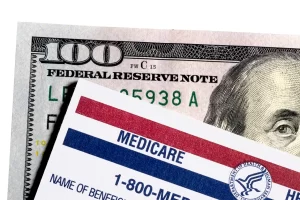
Copayments
Coinsurance
Deductibles
The Part B deductible is no longer covered by Medigap policies provided to those new to Medicare. As a result, beginning on or after January 1, 2020, no new Medicare beneficiaries will be allowed to enroll in Plans C and F. These plans that cover the Part B deductible may be available to anyone who became eligible for Medicare before January 1, 2020, but has not yet enrolled (Plan C or F). Before January 1, 2020, you can keep your current Plan C or F (or the Plan F high deductible variant).
The majority of Medigap policies also cover services that aren’t covered by Original Medicare, like medical treatment received when traveling outside the United States. The following is what occurs if you have Original Medicare and purchase a Medigap policy:
The Medicare-Approved Amount for approved health care expenses will be paid by the federal government.
After that, your Medigap insurance provider covers its portion of the cost.
Find Medicare Plans in 3 Easy Steps
We can help get up to $0 monthly premium Medicare plans
 8 things to know about Medigap policies
8 things to know about Medigap policies
Having Medicare Part A and Part B is a requirement.
Medigap insurance is not the same as a Medicare Advantage plan. Medigap policies are meant to supplement your Original Medicare benefits, not to replace them.
You pay a monthly premium to a private insurance company for your Medigap plan. Besides the monthly Part B fee that Medicare charges, you must also pay an additional monthly premium.
Only one individual is covered by Medigap coverage. To get Medigap coverage, you and your spouse will need to acquire separate policies.
A Medigap coverage can be purchased from any insurance company that is authorized to do business in your state.
Even if you have a pre-existing medical condition, regular Medigap coverage is assured to be renewed. As long as you continue to pay your premiums, your Medigap policy will be unaffected.
Drugs were covered by some Medigap policies that were previously sold. However, from January 1, 2006, Medigap policies can no longer include prescription medication coverage. You can enroll in a Medicare Prescription Drug Plan if you need prescription drug coverage (Part D). In some cases, you may be required to pay two premiums if you purchase Medigap and Medicare prescription coverage from the same provider. Find out how to pay your insurance premiums by contacting the company.
If you’re enrolled in a Medicare Advantage Plan, no one can sell you a Medigap policy unless you’re going back to your Original Medicare.
 Medigap policies don’t cover everything
Medigap policies don’t cover everything
The following items are typically excluded from Medigap coverage:
Care for the elderly
As if you were receiving non-skilled care in a nursing home
Services such as those related to vision or oral health
Aids to hearing
Eyeglasses
Nursing services are provided on a contract basis
 Insurance plans that aren’t Medigap
Insurance plans that aren’t Medigap
Medigap plans aren’t the only sort of insurance available.
Health Insurance for the Elderly (like an HMO, PPO, or Private Fee-for-Service Plan)
The Prescription Drug Programs Offered by Medicare
Medicaid
The Federal Employees’ Health Benefits Program (FEHBP) is one example of an employer or union plan (FEHBP)
Tricare
Benefits for war veterans
Insurance policy for long-term care
There are three types of Indian health plans: Tribal, urban, and Indian Health Services.
Find Medicare Plans in 3 Easy Steps
We can help get up to $0 monthly premium Medicare plans
 Dropping your entire Medigap policy (not just the drug coverage)
Dropping your entire Medigap policy (not just the drug coverage)
Some people choose a different Medigap policy entirely (not just your old Medigap policy without the prescription drug coverage). Medicare Advantage Plans with prescription drug coverage is an option as well.
If you decide to cancel your Medigap coverage completely, you must be very selective about when you do so.
If one of the following conditions is met, you will be subject to a late enrollment penalty:
It is not creditable prescription drug coverage if you cancel your full Medigap policy.
Your new Medicare drug coverage won’t kick in for another 63 days or more.



 8 things to know about Medigap policies
8 things to know about Medigap policies  Medigap policies don’t cover everything
Medigap policies don’t cover everything Insurance plans that aren’t Medigap
Insurance plans that aren’t Medigap Dropping your entire Medigap policy (not just the drug coverage)
Dropping your entire Medigap policy (not just the drug coverage) 

